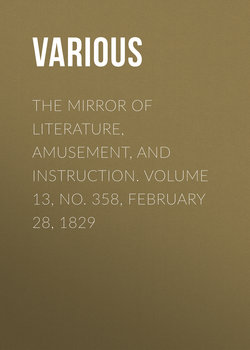Читать книгу The Mirror of Literature, Amusement, and Instruction. Volume 13, No. 358, February 28, 1829 - Various - Страница 6
YORK TERRACE,
ANIMAL FOOD
Оглавление(For the Mirror.)
It is generally allowed, that a profusion of animal food has a tendency to vitiate and debase the nature and dispositions of men; notwithstanding, the lovers of flesh urge the names of many of the most eminent in literature and science, in opposition to this assertion.
Plutarch attributed the stupidity of his countrymen, the Boeotians, to the profusion of animal food which they consumed, and even now, our lovely, soup drinking, coffee sipping friends on the continent, attribute the saturnine, melancholy, and bearish dispositions of John Bull, to his partiality for,
"The famous roast-beef of Old England."
A facetious, philosophical, friend of mine, lately amused me with some remarks, on the nature and properties of different kinds of food. "We know," said he, "that one herb produces this effect, and another that; that different species and varieties of plants have different virtues; and, why may we not infer that the same rule extends to animated nature; that our fish, flesh, and fowl, not only serve as nutriment, but that each kind possesses peculiar and individual properties."
This will account for the piggish habits and propensities so conspicuous in the inhabitants of certain places in England, and whose partiality for swine's flesh, is proverbial. The sheepish manners of our students and school-boys, may also be attributed to the mutton so generally alloted to them. I might continue my observations, ad infinitum. I might say, that the wisdom of the goose was discoverable in—whose love of that, "most abused of God's creatures," is well known: and that the sea-side predilections of a certain Bart., of festive notoriety, were occasioned by his partiality for turtle.
QUÆSITOR.
